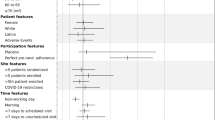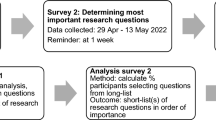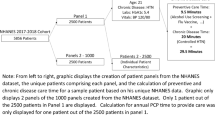Abstract
Background
Pay for performance (P4P) programs have shown only modest improvements in outcomes and do not target patient behaviors. Many large employers and payers are turning to pay for performance for patients (P4P4P) to reduce health costs and improve the health of their covered populations. How these programs may be perceived by patients is unknown.
Objective
To assess patients’ opinion of the acceptability of P4P4P.
Design
Cross-sectional self-administered survey.
Participants
Patients in waiting rooms in two university-based primary care clinics.
Measurements
Participants were asked their opinions about paying people to quit smoking, lose weight, control their blood pressure, or control their diabetes.
Results
Respondents were split on whether P4P4P is desirable. Thrity-six to 42% thought it was a good/excellent idea to pay smokers to quit smoking, obese people to lose weight, people with hypertension to control their blood pressure, or people with diabetes to control their blood sugar, while 41–44% of the sample thought it was a bad/very bad idea. Smokers and patients who were obese endorsed P4P4P more favorably as a means to achieving tobacco cessation and weight loss than their non-smoking and non-obese counterparts.
Conclusions
Acceptance of paying patients for performance by the general population is equivocal. Establishing the efficacy of paying patients for performance may help it gain wider acceptance.

Similar content being viewed by others
References
Galvin R. Evaluating the performance of pay for performance. Med Care Res Rev. 2006;63(1):126S–130S.
Epstein AM, Lee TH, Hammel MB. Paying physicians for high-quality care. New Engl J Med. 2004;350(4):406–410.
Epstein AM. Paying for performance in the United States and abroad. New Engl J Med. 2006;355(4):406–408.
Doran T, Fullwood C, Gravelle H, et al. Pay-for-performance programs in family practices in the United Kingdom. New Engl J Med. 2006;355(4):375–384.
Chassin MR. Does paying for performance improve the quality of health care? Med Care Res Rev. 2006;631(1):22S–125S.
Petersen LA, Woodard LD, Urech T, Daw C, Sookanan S. Does pay-for-performance improve the quality of health care? Annals Int Med. 2006;145(4):265–272.
Glickman SW, Ou FS, DeLong ER, et al. Pay for performance, quality of care, and outcomes in acute myocardial infarction. JAMA. 2007;297(21):2373–2380.
Lindenauer PK, Remus D, Roman S, Rothberg MB, Benjamin EM, Ma A, Bratzler DW. Public reporting and pay for performance in hospital quality improvement. New Engl J Med. 2007;356(5):486–496.
Rosenthal MB, Frank RG, Li Z, Epstein AM. Early experience with pay-for-performance: from concept to practice. JAMA. 2005;294(14):1788–1793.
Schroeder SA. Shattuck Lecture. We can do better - improving the health of the American People. New Engl J Med. 2007;357(12):1221–1228.
Centers for Disease Control and Prevention. Annual smoking-attributable mortality, years of potential life lost, and economic costs- United States, 1995–1999. MMWR Morb Mortal Wkly Rep. 2002;51(14):300–303.
Finkelstein EA, Fiebelkorn IC, Wang G. National medical spending attributable to overweight and obesity: how much, and who’s paying? Health Aff (Millwood). Jan–Jun 2003;Suppl Web Exclusives:W3-219-226. http://content.healthaffairs.org/cgi/content/full/hlthaff.w3.219v1/DC1 Last Accessed July 2, 2008
Yi D. For Many Employees, Fitness has its Prize. Los Angeles Times, March 12 2007.
Mcqueen MP. Wellness plans reach out to the healthy. Wall Street Journal Abstracts, 2007;March 28: D1.
Jordan S. Financial carrot is a healthy incentive, more companies use enticing benefits to lure workers into wellness programs. Omaha World Herald, 2007;March 25:A1.
Song KM. New health-benefits plan prompts county workers to diet and head for the gym. The Seattle Times, 2006;July 22:A1.
Conlin M. Get healthy _ or else. inside one company’s all-out attack on medical costs. Business Week Online, 2007;February 26. Available at http://www.businessweek.com/magazine/content/07_09/b4023001.htm Last Accessed July 2, 2008
Steinbrook R. Imposing personal responsibility for health. New Engl J Med. 2006;355(8):753–756.
West Virginia’s Medicaid State Plan Amendment (SPA) 06-02, approved by the Centers for Medicare & Medicaid Services, Department of Health and Human Services, May 3, 2006. Available at http://www.wvdhhr.org/bms/oAdministration/bms_admin_WV_SPA06-02_20060503.pdf Last Accessed July 2, 2008
Donatelle RJ, Hudson D, Dobie S, Goodall A, Hunsberger M, Oswald K. Incentives in smoking cessation: status of the field and implications for research and practice with pregnant smokers. Nicotine & Tobacco Research. 2004;9(Supplement 2):S163–S179.
Volpp KG, Gurmankin Levy A, Asch DA, et al. A randomized controlled trial of financial incentives for smoking cessation. Cancer Epidemiol Biomarkers Prev. 2006;15(1):12–18, Jan.
Lussier JP, Heil SH, Mongeon JA, Badger GJ, Higgins ST. A meta-analysis of voucher-based reinforcement therapy for substance use disorders. Addiction. 2005;101:102–203.
Higgins ST, Silverman K, eds. Motivating Behavior Change Among Illicit Drug Abusers: Research on Contingency Management Interventions. Washington, DC: American Psychological Association; 1999.
Marcus AC, Kaplan CP, Crane LA, et al. Reducing loss-to-follow-up among women with abnormal Pap smears. Results from a randomized trial testing an intensive follow-up protocol and economic incentives. Med Care. 1998;36(3):397–410, Mar.
Stevens-Simon C, O’Connor P, Bassford K. Incentives enhance postpartum compliance among adolescent prenatal patients. J Adolesc Health. 1994;15(5):396–399, Jul.
Malotte CK, Rhodes F, Mais KE. Tuberculosis screening and compliance with return for skin test reading among active drug users. Am J Public Health. 1998;88(5):792–796, May.
Seal KH, Kral AH, Lorvick J, McNees A, Gee L, Edlin BR. A randomized controlled trial of monetary incentives vs. outreach to enhance adherence to the hepatitis B vaccine series among injection drug users. Drug Alcohol Depend. 2003;71(2):127–131, Aug 20.
Jeffery RW, Thompson PD, Wing RR. Effects on weight reduction of strong monetary contracts for calorie restriction or weight loss. Behav Res Ther. 1978;16(5):363–369.
Finkelstein EA, Linnan LA, Tate DF, Birken BE. A pilot study testing the effect of different levels of financial incentives on weight loss among overweight employees. J Occup Environ Med. 2007;49(9):981–989, Sep.
Jeffery RW, Gerber WM, Rosenthal BS, Lindquist RA. Monetary contracts in weight control: effectiveness of group and individual contracts of varying size. J Consult Clin Psychol. 1983;51(2):242–248, Apr.
Sindelar J, Elbel B, Petry NM. What do we get for our money? Cost-effectiveness of adding contingency management. Addiction. 2007;102(2):309–316, Feb.
Sindelar JL, Olmstead TA, Peirce JM. Cost-effectiveness of prize-based contingency management in methadone maintenance treatment programs. Addiction. 2007;102(9):1463–1471, Sep.
Kane RL, Johnson PE, Town RJ, Butler M. A structured review of the effect of economic incentives on consumers’ preventive behavior. Am J Prev Med. 2004;27(4):327–352.
Tversky A, Kahneman D. The framing of decisions and the psychology of choice. Science. 1981;211:453–458.
Acknowledgements
The work in this paper was supported by a grant from the Commonwealth of Pennsylvania, titled Collaboration to Reduce Disparities in Hypertension, grant no. ME-02-382.
The Commonwealth bears no responsibility for the content of this article. This paper was presented as a poster at the Society of General Internal Medicine 2007 National Meeting in Toronto, Canada, 2007.
Conflict of Interest
Drs. Long and Helweg-Larsen have no conflicts of interest in relationship to this work. Dr. Volpp received an honorarium from Astra Zeneca for convening a conference on medication adherence as well as receiving investigator initiated grant support from Pfizer for ongoing patient follow-up for a randomized controlled trial of copayment reductions that was initiated through the grant that also supported this work (the Commonwealth of Pennsylvania sponsored Collaboration to Reduce Disparities in Hypertension, grant no. ME-02-382).
Author information
Authors and Affiliations
Corresponding author
Electronic supplementary material
Electronic supplementary material
ESM 1
(PDF 53.4 KB)
Rights and permissions
About this article
Cite this article
Long, J.A., Helweg-Larsen, M. & Volpp, K.G. Patient Opinions Regarding ‘Pay for Performance for Patients’. J GEN INTERN MED 23, 1647–1652 (2008). https://doi.org/10.1007/s11606-008-0739-1
Received:
Revised:
Accepted:
Published:
Issue Date:
DOI: https://doi.org/10.1007/s11606-008-0739-1




